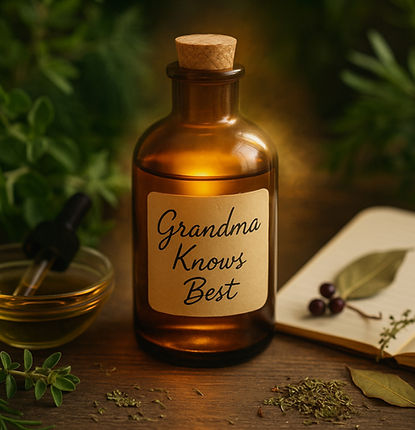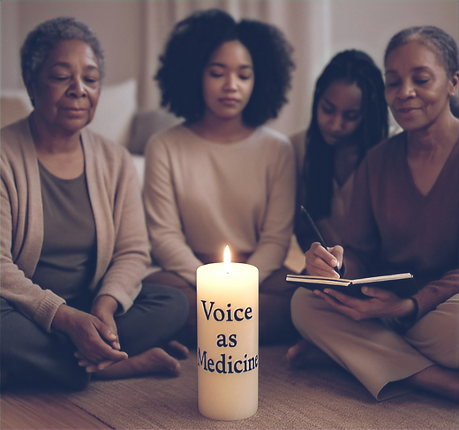

Grandma Knows Best
A mental wellness space grounded in Black love, legacy, and listening.
Healing Rest Resistance

A Legacy of Love
Welcome to Grandma Knows Best
A digital sanctuary for those too often left unheard.
This site is for Black women, non-traditional grandmothers, and anyone surviving systems not built for us. Through storytelling, reflection, and rest, we explore what it means to survive and thrive—softly.
Carla Rodney
Land Acknowledgment
At GrandmaKnowsBest.org, I humbly acknowledge that my work takes place on the traditional territories of Indigenous Nations who have cared for these lands since time immemorial. Specifically, I recognize and honor the territory of the Anishinabek, Huron-Wendat, Haudenosaunee and Ojibway/Chippewa peoples; the land that is home to the Metis; and most recently, the territory of the Mississaugas of the Credit First Nation who are direct descendants of the Mississaugas of the Credit.peoples. I deeply respect their enduring connection to the land, water, and community, and I acknowledge the ongoing role of Indigenous Peoples as stewards of these territories.
My mission to promote mental health and well-being through culturally relevant support is deeply inspired by the values of respect, interconnectedness, and holistic healing central to Indigenous ways of knowing. Guided by the wisdom of our ancestors, I strive to create a safe and inclusive space for all while amplifying voices that have historically been silenced in traditional systems of care.
I am committed to continuous learning, reflection, and meaningful action in support of reconciliation. This includes integrating Indigenous healing practices into my resources, collaborating with Indigenous-led initiatives, and building relationships founded on mutual respect and reciprocity.
As I move forward, I invite you to join me in honoring the lands we stand on and the people whose histories, traditions, and futures are deeply interwoven with them.
More About Grandma
Finding Inspiration in Every Turn
Grandma Knows Best website's mission is crucial because it addresses multiple gaps in the existing mental health and well-being support systems, particularly for marginalized communities like Black Canadians.
Let’s explore why this mission matters and how it fills critical voids:
1. Culturally Relevant Mental Health Support
-Mainstream mental health services in Canada often overlook the unique cultural and historical contexts of Black, Indigenous, and other racialized communities. Your website, grandmaknowsbest.org, offers culturally relevant resources that resonate with these groups.
Here’s why this matters:
- Cultural Competency: Many mental health practitioners lack training in culturally responsive care, which can alienate individuals seeking help. Black and racialized people may experience racism, systemic oppression, and cultural dissonance within mainstream health services. This can lead to distrust, poor outcomes, and disengagement. Your website acknowledges these barriers and offers alternatives that feel familiar and trustworthy.
- Breaking Stigmas: Mental health issues carry significant stigma in many Black communities, rooted in cultural, religious, and historical factors. By offering culturally sensitive content, your platform helps deconstruct these stigmas, making mental health care more accessible and less intimidating for those who need it most.
- Representation Matters: When Black people see mental health supports designed by and for their communities, it encourages engagement. Your site provides a safe space where people can feel seen and understood, promoting self-empowerment and a proactive approach to mental health.
2. Addressing Mental Health in a Holistic and Accessible Way
Your site takes a holistic approach to well-being, which is often missing in traditional mental health services. This is particularly important for Black Canadians and others from marginalized communities, where health is viewed more expansively, integrating mind, body, and spirit. Here’s how your mission supports this:
-Holistic Practices: Many Black and Indigenous cultures place a high value on holistic health approaches—ones that include spiritual, communal, and physical dimensions. Your site’s inclusion of indigenous and elder supports, DIY suggestions, and alternative approaches—such as herbal remedies, mindfulness practices, and community care—offers individuals options that align with their cultural values.
- Community Healing: In many Black cultures, healing is often a communal process rather than an individual pursuit. Your website offers community-driven resources and insights that foster collective healing and support. This reflects a key aspect of Black mental health: the understanding that healing happens within relationships and networks of care, not in isolation.
- Low-Cost Solutions: You’ve emphasized providing support at low to no cost—a crucial factor in your mission. Many marginalized people face financial barriers to accessing quality mental health care, which often isn’t covered by insurance or requires out-of-pocket expenses. Your website provides accessible solutions, including self-care strategies, DIY techniques, and resources that don’t require high financial investment.
3. Filling the Gaps in Canada's Mental Health System
The Canadian mental health care system, while robust in some areas, has significant gaps when it comes to equitable access and inclusivity, particularly for marginalized communities. This website has been created to help fill those gaps by offering support in ways that mainstream systems often fail to do:
- The Elimination of Long Wait Times: Mental health services in Canada are plagued by long wait times, especially for publicly funded care. This can be detrimental to people in crisis or those with chronic mental health challenges. Your website offers immediate, on-demand resources that can help individuals get the support they need without waiting for months to see a therapist.
- Limited Culturally Trained Providers: Even when services are available, many mental health professionals in Canada lack the training to work with clients from diverse cultural backgrounds. My website sidesteps this issue by providing culturally relevant advice, making sure that people from Black, Indigenous, and racialized communities can find guidance and resources that speak to their specific experiences.
- Trauma and Systemic Oppression: Black Canadians, and other marginalized communities, often face specific challenges like racial trauma, intergenerational trauma, and systemic oppression. These issues are rarely addressed by general mental health services. Grandma's platform’s provide culturally aligned content helping to bridge this gap by addressing the unique mental health impacts of racism and providing strategies to cope with these challenges.
4. Challenging Stereotypes Around Mental Health
Our mission also tackles deep-rooted stereotypes surrounding mental health in Black communities. Many Black individuals are taught to be strong, resilient, and “push through” their struggles, which can prevent them from seeking the support they need. Your website works to challenge this by:
- Promoting Vulnerability as Strength: The notion that seeking help or showing vulnerability is a weakness is prevalent in many communities. Your site challenges this narrative by promoting the idea that seeking mental health support is a form of strength and self-care.
- Changing the Conversation: By creating a platform where mental health is openly discussed, you’re helping to shift the dialogue around mental health in Black communities. My content normalizes talking about emotional well-being, breaking down barriers for others to do the same.
- Empowering Individuals: Many mainstream mental health approaches can feel disempowering, with individuals relying heavily on medical professionals. Your site’s focus on DIY strategies and holistic wellness empowers people to take charge of their own mental health, providing them with tools they can use in their daily lives.
5. Building Resilience in the Black Community
Resilience is a key theme for your website, and for good reason. Black Canadians have historically faced systemic barriers in almost every aspect of life—education, employment, health care, and justice. Your platform seeks to build resilience by promoting well-being practices that allow individuals to thrive despite these challenges:
- Supporting Generational Healing: I have created a space where the wisdom of elders and Indigenous practices is integrated into mental health and wellness strategies. This focus on generational healing and the transmission of knowledge honors the importance of ancestral wisdom and ensures that Black Canadians can benefit from the strength of their cultural heritage.
- Encouraging Self-Care and Preservation: In the face of systemic racism and ongoing challenges, self-care becomes a form of resistance. By providing accessible, culturally aligned mental health resources, your platform encourages Black Canadians to prioritize their mental health as an act of self-preservation and empowerment.
- Inspiring Collective Action: My website’s mission is not just about individual well-being, but collective resilience. It builds a sense of community, encouraging users to lean on each other and recognize that they are part of a larger movement towards healing and empowerment.
6. A Model for Broader Mental Health Approaches
This website, grandmaknowsbest.org, could serve as a model for broader mental health approaches in Canada and beyond. By centering marginalized voices, promoting accessibility, and embracing culturally relevant methods, your platform offers a template for how mental health care can become more inclusive and effective:
- Advocating for Systemic Change: I'm not just providing tools for individuals—I'm advocating for a shift in how mental health is approached in Canada. My work calls for mental health care that embraces cultural, spiritual, and communal healing as integral components of well-being.
- Influencing Policy and Practice: As this platform grows, it has the potential to influence mental health policy and practice. By demonstrating the effectiveness of culturally relevant approaches, you can help advocate for systemic changes that better serve marginalized populations.
- Expanding Conversations Around Wellness: Our mission encourages a more expansive view of mental health, integrating not only traditional therapeutic approaches but also community, spirituality, and self-care. This challenges the often narrow, medicalized view of mental health care and opens the door for more holistic approaches.
In sum, my website's mission is crucial because it addresses multiple systemic gaps in mental health care, particularly for marginalized communities in Canada. It offers culturally relevant, accessible, and holistic resources that empower individuals while promoting community healing and resilience. In a world where mainstream mental health services often fail to serve the most vulnerable, grandmaknowsbest.org stands as a beacon of hope and a model for inclusive mental health care.

Our Creation Story
Every website has a story, and this is the creation story of Grandma Knows Best. It began with the tragic loss of Caleb Vickers, the 14-year-old son of a very close friend. Caleb was autistic, and when he passed away in May 2021, it felt as though the world dismissed his death, treating it as something that could be explained away by his disability. His sister, just 10 years old at the time, was struggling deeply with her brother's passing.
What I found in trying to support her was that the professionals we turned to seemed more concerned with how their services would be covered than the mental well-being of a grieving child. Worse still, there was a sense that because Caleb was autistic, his life—and death—weren’t valued as they should have been. We were left feeling that Caleb’s death was being blamed on his disability, and that society had labeled him a "problem."
This deeply unsettling experience drove me to create Grandma Knows Best—a space where mental health and well-being are prioritized, where people, especially Black people, can find culturally relevant and compassionate support without the barriers of cost or stigma. This is a place for healing, for embracing wholeness, and for turning away from a system that too often lets people down.

For You




